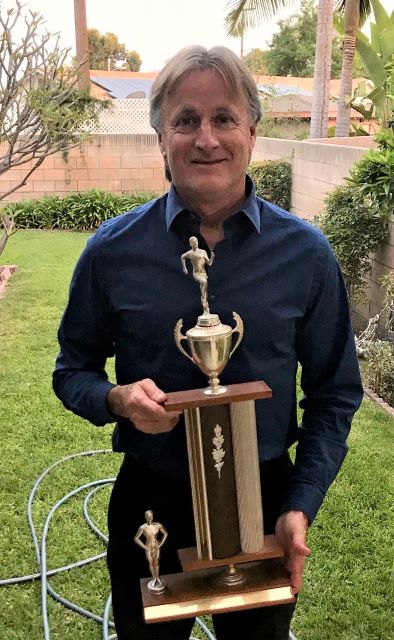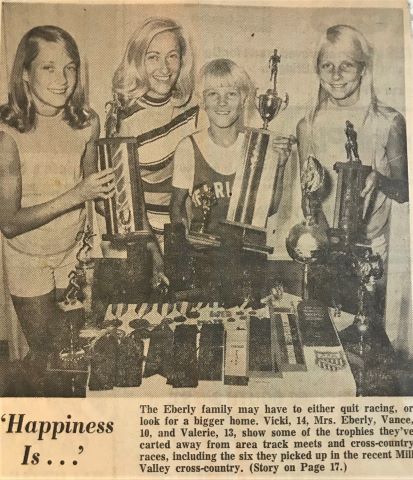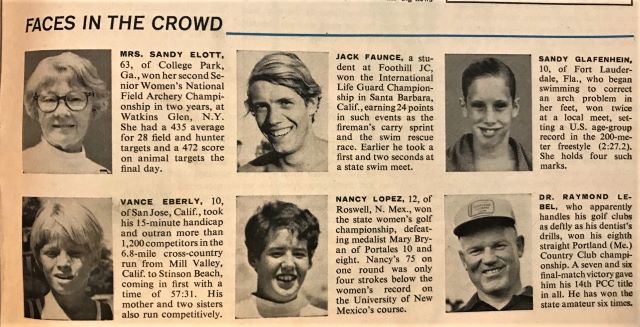Vance Eberly Celebrating 50th Anniversary of Dipsea Win

Vance Eberly with his 1969 Dipsea Trophy
When Vance Eberly won the Dipsea in 1969 as 10-year-old blond fourth grader, he celebrated the victory with a triple scoop of ice cream at Baskin Robbins.
This Sunday, to mark the 50th anniversary of his Dipsea win, Eberly says he is thinking of going surfing at San Onofre Beach and may bring a bottle of champagne along to celebrate his feat five decades ago.
To be honest, the 50th anniversary of his 1969 Dipsea triumph snuck up on him.
"I had no idea," says Eberly, now an orthopedic surgeon in Downey. "If I had, I might have gone out and started training again for the race."
On August 24, 1969 Richard Nixon was president and the first publicized revolt of American soldiers in Vietnam became news. The Beatles were recording their final song as a group in their Abbey Road studio in London, the Rolling Stones had the No. 1 song " Honky Tonk Woman" in America and they were clearing up the mess left over from some Woodstock concert in upstate New York.
But Eberly remembers that day because he crossed the finish line first in the Dipsea one year after getting lost on the course in the fog and placing 35th.
"I knew because of the previous year that I was going to do fairly well, but not enough to win it," Eberly recalls.
He and his coach, Gary Gallego, came up from San Jose to train on the Dipsea Trail for the 1969 race after Eberly's wrong turn the year before. This time they were prepared by learning the nuisances of the course and its short cuts.
They had extra motivation as well. According to Barry Spitz's book Dipsea: The Greatest Race, Flory Rodd had predicted he would win the race and the father of competitor Mike Wolford boasted that his son, who placed second in the Dipsea in 1968, was faster than Eberly, even though Eberly had set a national under-10 age group AAU record for the mile with a time of 5:17.
"That's the first time in 50 years I remember that," Eberly recalls. "His dad was kind of a jerk, but that didn't factor into anything."
Eberly simply and steadily ran his race. He pulled away from Wolford on Hogsback and held off the 46-year-old Rodd, who finished runner-up.
"I didn't know I was leading the race until I came down the Stile into the road (Highway 1) there," Eberly says. "My coach and my uncle just went crazy because I was the first guy."
Not only did Eberly win the race, but his older sister, 14-year-old Vicki, clocked the fastest time ever recorded by a female in the Dipsea to that point, though women results were deemed "unofficial" by the AAU. She unofficially finished 21th overall, passed in the final stretch by hard-kicking Dipsea legend Jack "The Dipsea Demon" Kirk. Vicki and Vance's mom, Myrrha, who also competed and placed 638th, earned the Eberlys the "Mother-Daughter Trophy." Another Eberly sister, Valerie, placed 60th.

The Eberly Family showing off their trophies
The Eberlys took all their hardware home to San Jose. A local newspaper snapped a photo of them with all their trophies and Vance wound up appearing in the September 14, 1969 college football issue of Sports Illustrated (which then cost 50 cents) in the magazine's "Faces In The Crowd." Woody Hayes and the Ohio State Buckeyes were No. 1 in the nation and Eberly was the defending champion of the Dipsea.

Vance Eberly appearing in Sports Illustrated's "Faces in the Crowd"
However the next year Eberly did not train as well for the Dipsea. He wound up placing 41st, but he had a pretty good excuse. His mother was a professional scuba diver and she was participating in the search for the lost wreck of the Santa Maria, the flagship which Christopher Columbus first sailed to America. Eberly was with his family on vacation in Haiti for two months prior to the Dipsea in 1970.
That was the third and last time Eberly competed in the race. The next year, 1971, nine-year-old Michael Boitano outlasted 61-year-old Norman Bright to win the Dipsea and Dr. Francis Conley became the first "official" female finisher in the race when the AAU finally opened and recognized women in long distance running.
Almost 40 years went by before Eberly, now living in Southern California, decided to come back to the Dipsea for sentimental reasons. He, his sister Vicki and his mother planned to attend the 100th Dipsea Gala celebration in Mill Valley in 2010 but Vance had to stay back.
"I wanted to go, but I couldn't," Eberly says. "There was some conflict and I ended up not being able to go."
Too bad. Had Eberly attended he would have been able to see another blond fourth grader, 8-year-old Reilly Johnson, win the Dipsea that year 41 years after he won the Dipsea as a blond fourth grader. How ironic.